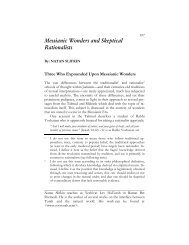Is There a Disconnect between Torah Learning and ... - Hakirah.org
Is There a Disconnect between Torah Learning and ... - Hakirah.org
Is There a Disconnect between Torah Learning and ... - Hakirah.org
You also want an ePaper? Increase the reach of your titles
YUMPU automatically turns print PDFs into web optimized ePapers that Google loves.
38 : Hạkirah, the Flatbush Journal of Jewish Law <strong>and</strong> Thought<br />
blushing! I was embarrassed by my behavior. Feeling extremely hot<br />
<strong>and</strong> uncomfortable, I got up <strong>and</strong> offered the lady my seat.<br />
A moral person does not merely reason that something is wrong.<br />
S/he feels that it is wrong. The pasuk exhorts: '<br />
“Those who love G-d abhor wickedness.” Abhorrence is an<br />
emotional state, not an intellectual decision. Where do such feelings<br />
come from, <strong>and</strong> how do we get children to internalize them? I would<br />
like to address this in the following paragraphs.<br />
Moral Intuition:<br />
—אוהבי ה שנאו רע<br />
In what I found to be a very important <strong>and</strong> enlightening paper,<br />
psychologist Jonathan Haidt 40 addresses the question of what it is<br />
that drives <strong>and</strong> determines our moral judgment, “is it logic or<br />
intuition?” In a persuasive paper he argues against the widely<br />
assumed supremacy of reason in moral judgment. He points out that<br />
there is little evidence of a correlation <strong>between</strong> moral reasoning <strong>and</strong><br />
moral action. In fact, to cite an extreme example, psychopaths have<br />
been shown to be capable of excellent moral reasoning, but feel no<br />
need to act morally. On the other h<strong>and</strong>, there are strong links<br />
<strong>between</strong> moral emotions <strong>and</strong> moral action. Because of this, <strong>and</strong> in<br />
combination with other arguments, he puts forth the thesis that most<br />
moral judgments are made intuitively, by way of a quick automatic,<br />
unconscious, <strong>and</strong> unreasoned reaction to a situation, rather than via<br />
rational, reasoned consideration <strong>and</strong> judgment. Haidt asserts that<br />
rational, reasoned logic is used often to back up, support <strong>and</strong> argue<br />
for the correctness of our intuitive judgments, but only after the fact.<br />
Reasoned logic by itself does not give rise to any emotional reaction<br />
to the immoral <strong>and</strong>/or the unethical. However, it is precisely this<br />
emotional reaction of disgust, that influences <strong>and</strong> guides behavior. 41<br />
40 Jonathan Haidt, “The Emotional Dog <strong>and</strong> Its Rational Tail; A Social<br />
Intuitionist Approach to Moral Judgment,” Psychological Review, 2001<br />
Volume 108, No. 4, pp. 814–834.<br />
41 Haidt points out that arguments over moral issues rarely if ever result<br />
in one party convincing the other of their position. Instead, such<br />
debates end with one party saying something to the effect of “You are<br />
better with words than I am, <strong>and</strong> I cannot counter your arguments. I<br />
cannot prove it to you, but I know that I’m right.” This is because our
















